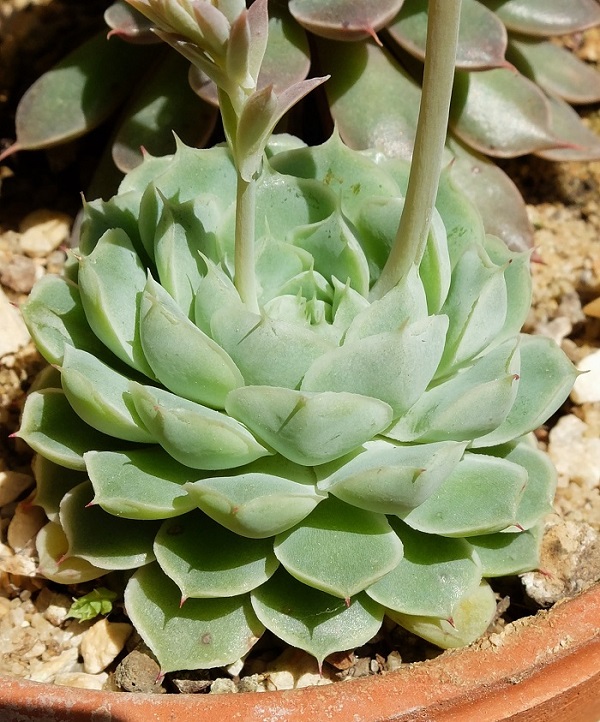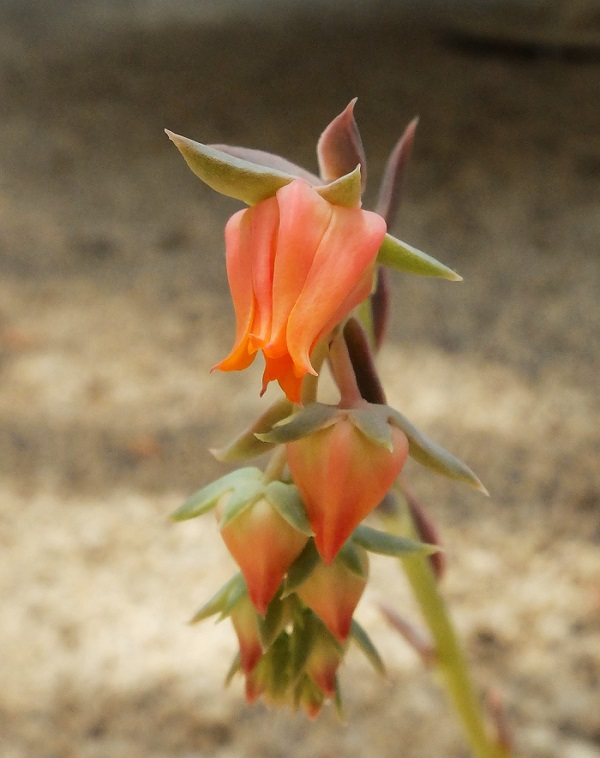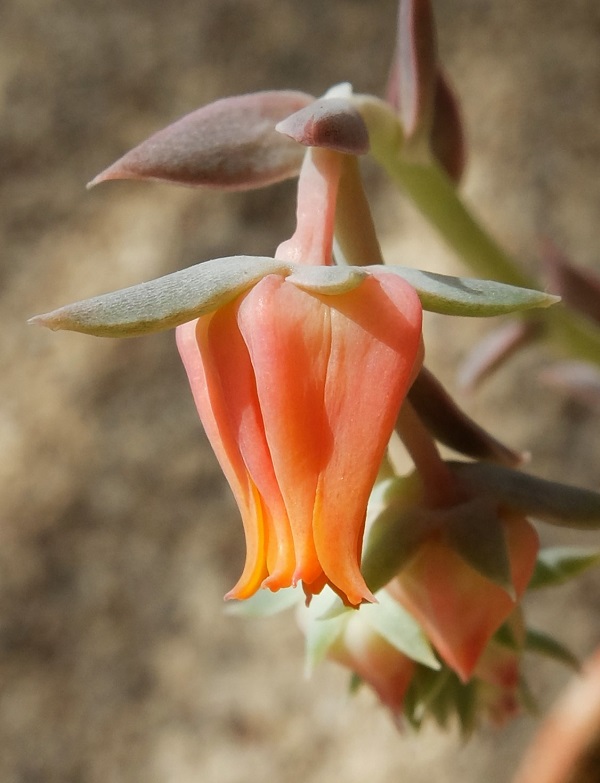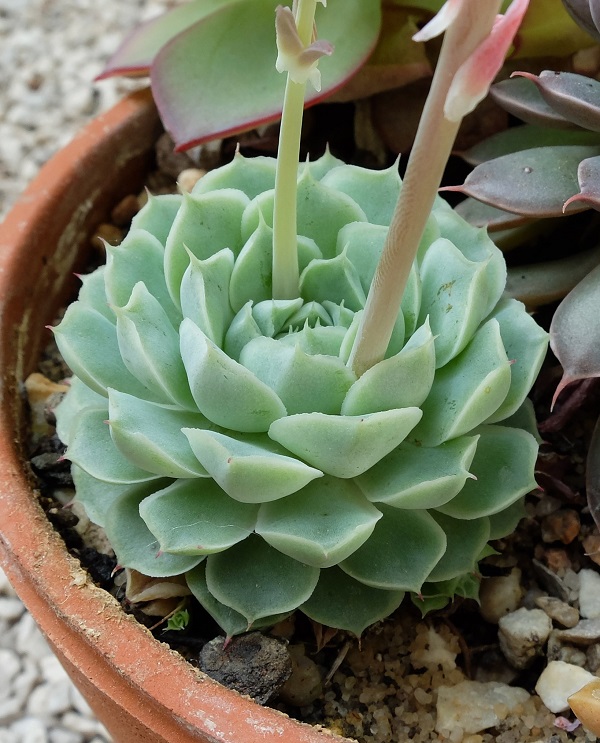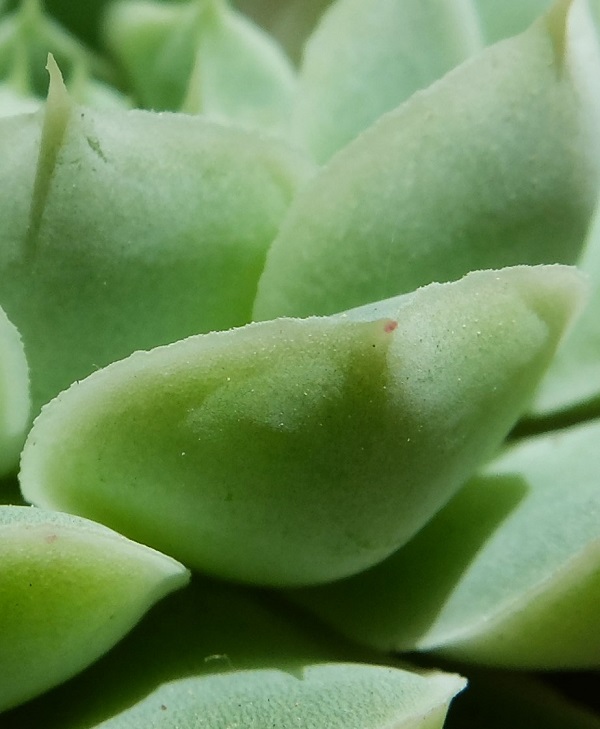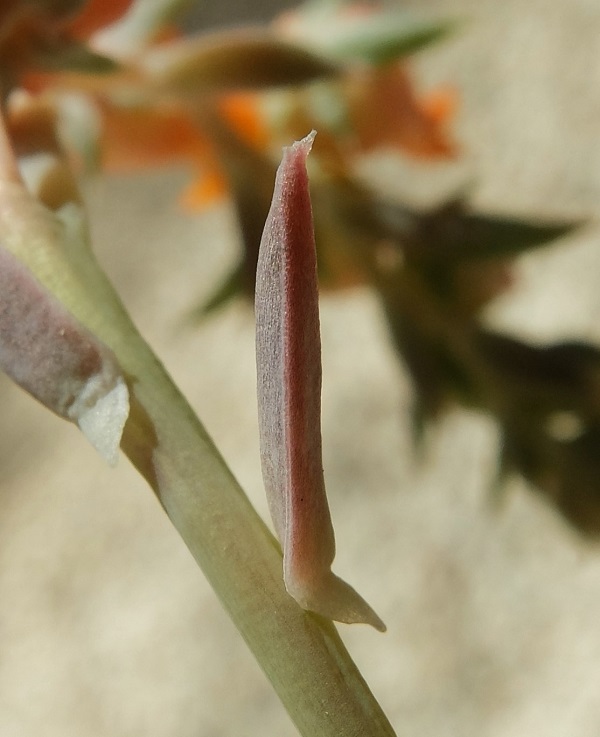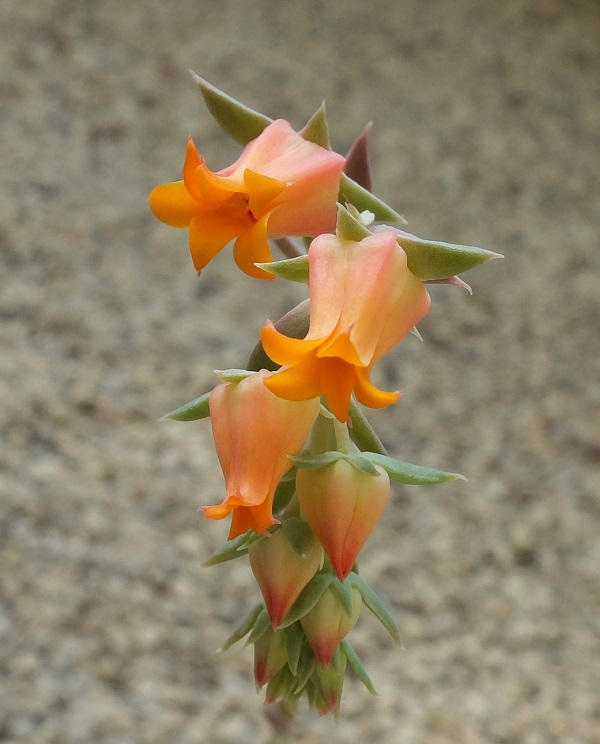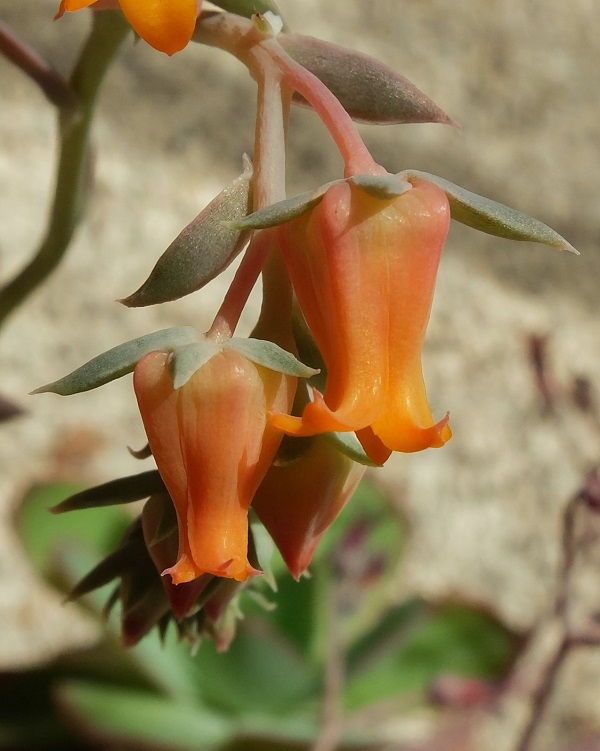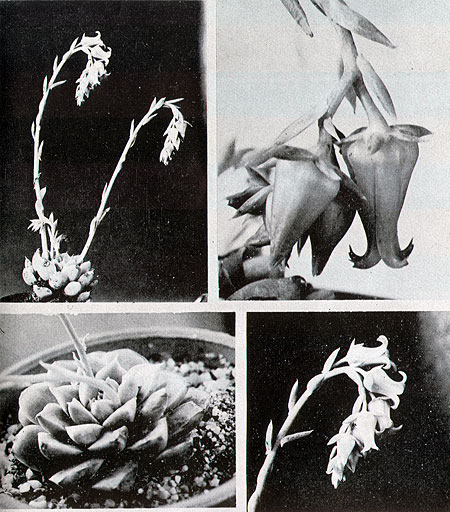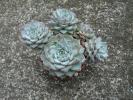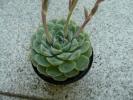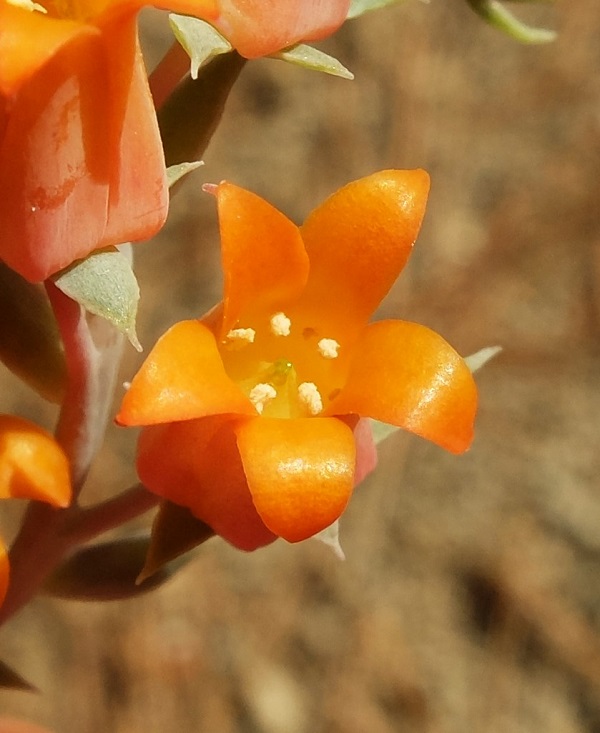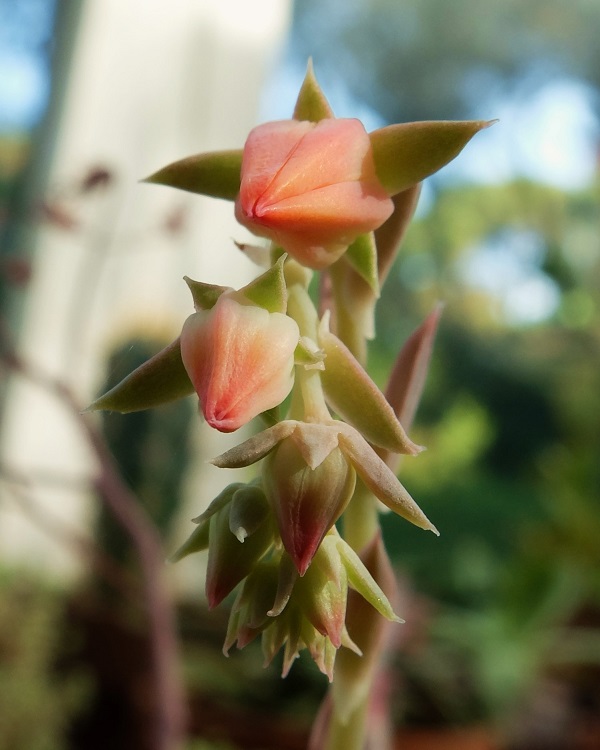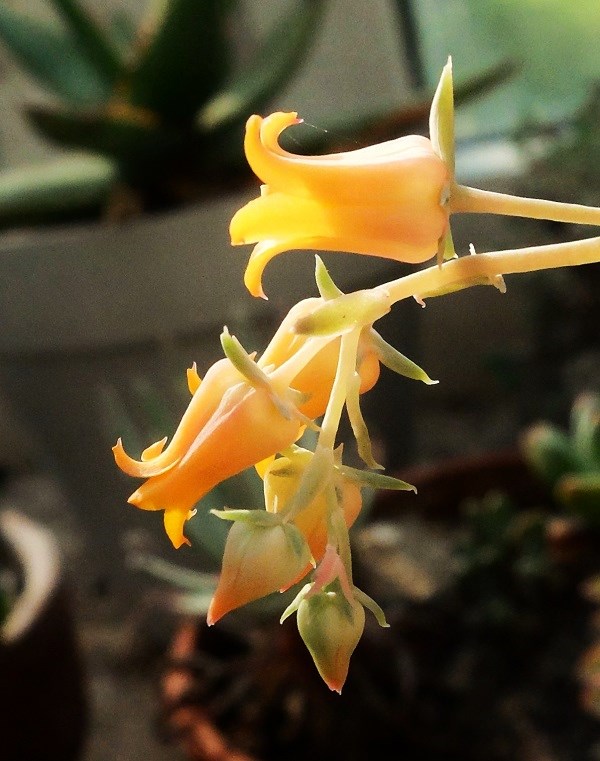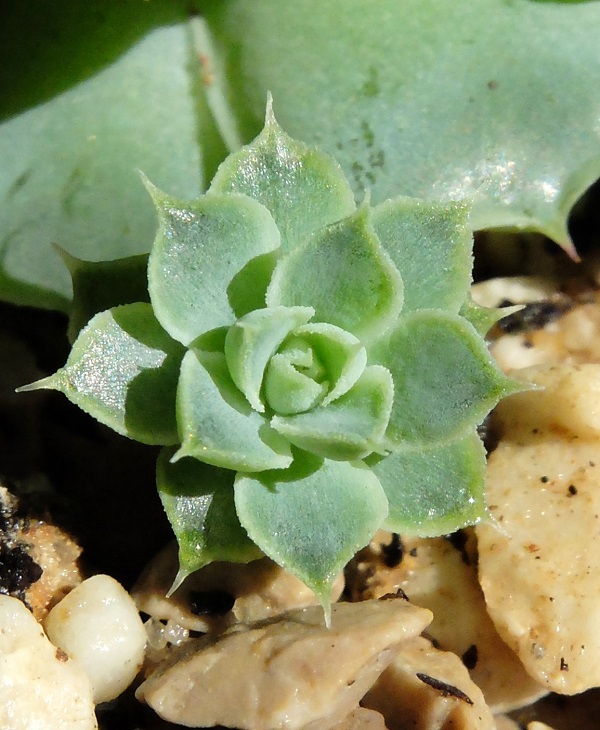You are not logged in.
- Topics: Active | Unanswered
Pages: 1
#1 2015-07-03 09:38:08
- Tom
- Member

- Registered: 2011-09-08
- Posts: 1,722
Echeveria halbingeri (collection de Bob Grim).
Offline
#2 2015-07-07 12:14:09
- Tom
- Member

- Registered: 2011-09-08
- Posts: 1,722
Re: Echeveria halbingeri (collection de Bob Grim).
Une plante particulière, chez qui tout finit bien en pointe (feuille, bractée, sépale, pétale).
Voici à nouveau cette petite rosette (4-5 cm de diamètre), mais à l'ombre.
la marge des feuilles est très finement cartilagineuse et dentelée.
Bractée munie d'un éperon basal et se terminant en pointe.
Des fleurs d'un bel orange contrastant avec le feuillage bleuté.
Margrit, es-tu sûre qu'elle n'est pas à rapprocher d'E. halbingeri ?
Elle ressemble beaucoup à la description originale de 1958, avec floraison orange en juillet.
Last edited by Tom (2015-07-07 12:21:31)
Offline
#3 2015-07-07 20:32:39
- margrit
- Administrator
- Registered: 2007-09-03
- Posts: 5,388
Offline
#4 2015-07-07 20:34:36
- margrit
- Administrator
- Registered: 2007-09-03
- Posts: 5,388
Offline
#5 2015-07-08 05:17:11
- Tom
- Member

- Registered: 2011-09-08
- Posts: 1,722
Re: Echeveria halbingeri (collection de Bob Grim).
Quelle caractéristique te fait dire que la plante provenant de Bob Grim n'est pas E. halbingeri.
Pour moi, toutes les photos du fichier ne correspondent pas à la description originale.
Walther parle de feuilles obtuses et « biscay-green », celles visibles sur le fichier sont plutôt acuminées et bleutées à gris-mauve ; l'ancienne photo montre aussi une marge tranchante et un dessus plat à légèrement bombé et non légèrement creusé ; les boutons sont pointus et allongés alors que sur le fichier ils sont trapus et bombés ; les sépales devraient être verdâtres tandis que la plante du fichier montre des sépales rosés. Conformément à la description, les pédicelles doivent mesurer la moitié de la longueur de la corolle, or, sur les photos du fichier, le pédicelle semble aussi long que la corolle.
Bref ! autant de détails qui me font douter.
Last edited by Tom (2015-07-08 15:31:34)
Offline
#6 2015-07-08 19:44:40
- margrit
- Administrator
- Registered: 2007-09-03
- Posts: 5,388
Offline
#7 2015-07-09 02:43:30
- Tom
- Member

- Registered: 2011-09-08
- Posts: 1,722
Re: Echeveria halbingeri (collection de Bob Grim).
Mais cela ne me suffit pas ; la var. sanchez-mejoradae a eu son imposteur, la var. halbingeri a maintenant aussi le sien.
La vraie E. halbingeri provient de l'Hidalgo, et elle fleurit durant l'été ; l'imposteur a une floraison de début de printemps, si je ne me trompe pas.
Grâce à toi et à Bob Grim, je cultive cette petite beauté d'E. halbingeri, merci. ![]()
Last edited by Tom (2015-07-09 08:57:02)
Offline
#8 2015-07-12 07:16:16
- Tom
- Member

- Registered: 2011-09-08
- Posts: 1,722
Offline
#9 2015-07-12 14:57:04
- tephro49
- Member

- From: Saumur - Maine et Loire
- Registered: 2011-01-17
- Posts: 156
Re: Echeveria halbingeri (collection de Bob Grim).
Quelle couleur ! ![]()
ma galerie : http://www.flickr.com/photos/tephro49/c … 563270370/
Offline
#10 2015-07-17 09:38:32
- Tom
- Member

- Registered: 2011-09-08
- Posts: 1,722
Offline
#11 2015-08-04 16:35:59
- Tom
- Member

- Registered: 2011-09-08
- Posts: 1,722
Offline
#12 2015-08-22 12:38:01
Re: Echeveria halbingeri (collection de Bob Grim).
Hi,
maybe both plants are Echeveria halbingeri. In the case of Echeveria setosa we can see how different a Echeveria-species at almost the same location can be. Here E. Walther has described an extreme Form as Echeveria ciliata. Even E. halbingeri could be that variable. For his first description Walther has only one (?) specimen from one collection of Halbinger without a definite locality. This says nothing about the diversity of a species in nature.
The colour and shape of the leaves and sepals and the length of the pedicels are, in my eyes, no good characteristics in the genus Echeveria. Look at the wild Populations of Echeveria carnicolor here on our site. Or all the different E. gibbiflora-Forms. These traits show only trends but are variable. The flowering time is very interesting but could depend on the place where the plants are cultivated. Maybe you should propagate your plant and send them to other collectors all over Europe/World to see if the flowering is everywhere the same.
E. halbingeri and E. pulidonis are the only Echeverias with petals that are distinctly recurved in a unique way at the tips. In my collection are two clones of Echeveria halbingeri. One from an succulent-nursery here in Germany and one from San Joaquin (near Puente Tepozan), Queretaro. The rosettes are a little bit different, but the flowers are nearly the same and the plants fit the description of Walther. At the old Forum I have made a comparison of my E. halbingeri and the first description and they are only slightly different.
A plant don´t know the manmade boundaries. The Distance between Actopan in Hidalgo and Puente Tepozan in Queretaro is only 100 km in the same Mountains. Obviously 2012 the species was also found in Veracruz (http://www.crassulaceae.com/botanik/pfl … 0670-2.pdf). So they are hopped over the Sierra Madre Oriental ;-). We all know how tiny Crassulaceae-Seed are......
So, what should we do? I think, that the Grim-Plant represents a clone of E. halbingeri different from the already known.
Offline
#13 2015-08-22 14:42:34
- Tom
- Member

- Registered: 2011-09-08
- Posts: 1,722
Re: Echeveria halbingeri (collection de Bob Grim).
Hi,
I think that Grim-Plant is the typical E. halbingeri, and the other one could be a varietas, or another species, I don't know. I agree with you about the variability of many species, and the relationship with the Uhl-Plant needs further investigation.
I will propagate my nice plant as soon as possible, but I know that Mateo Lichtenstein had already this plant and he photographed the flowers on September 1st.
Last edited by Tom (2015-08-22 15:51:48)
Offline
#14 2015-08-23 10:25:09
- Mat
- Member
- Registered: 2011-11-11
- Posts: 44
Re: Echeveria halbingeri (collection de Bob Grim).
Hello all,
Here are the pictures of the same plant Tom is showing in case it can help for the discussion
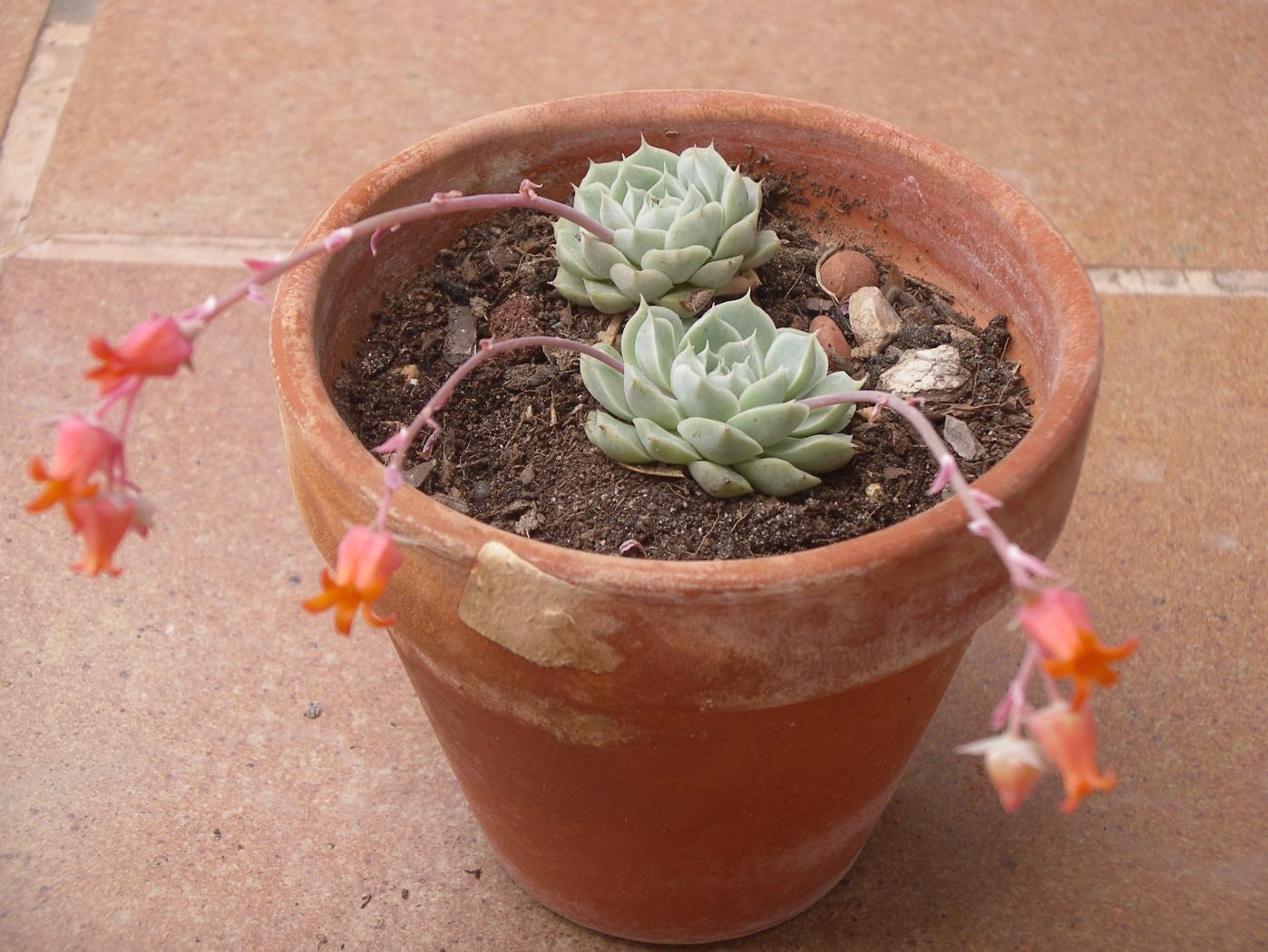
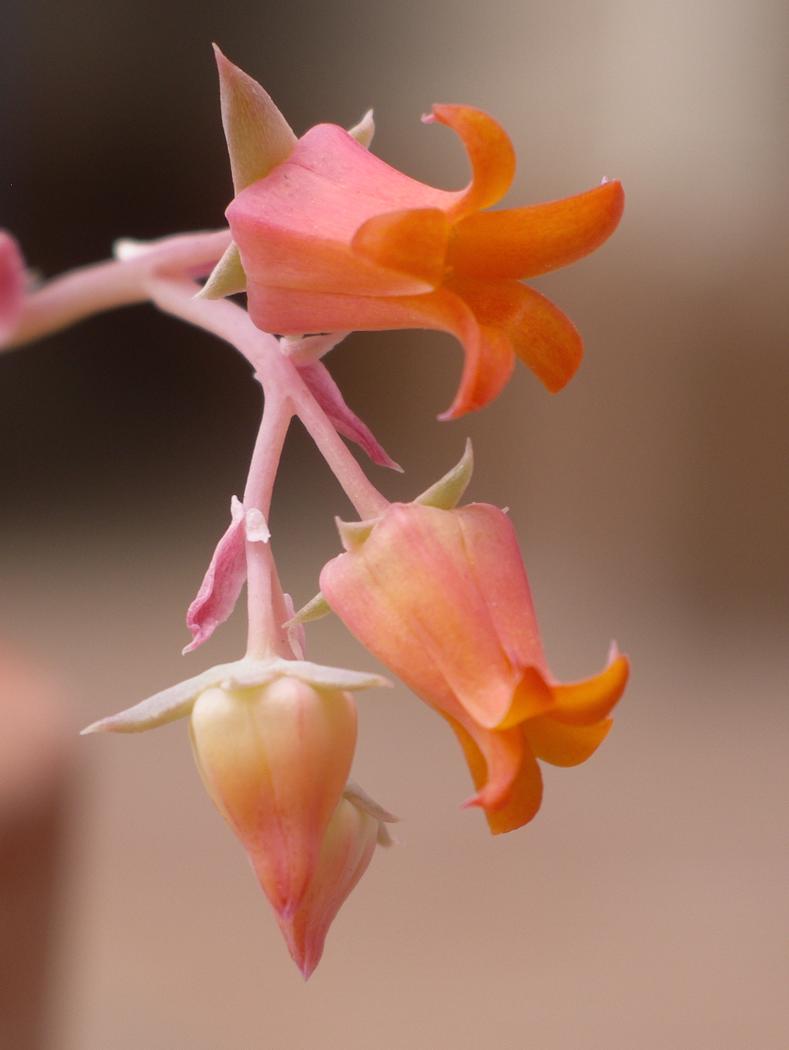
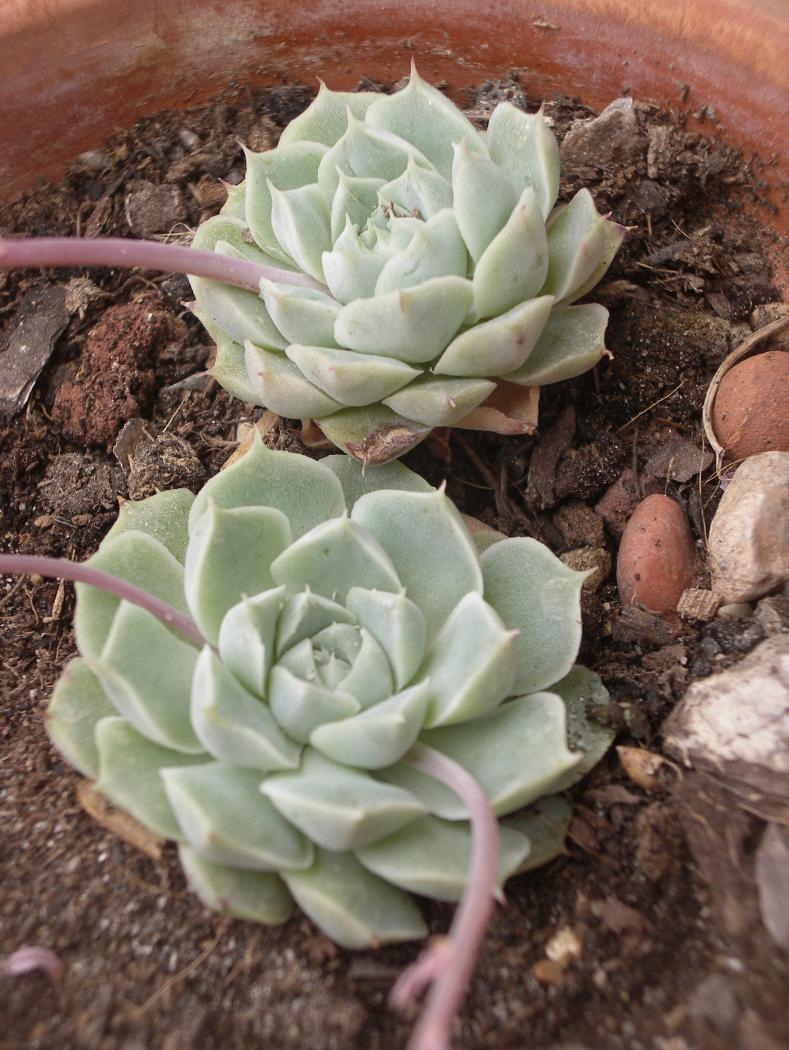
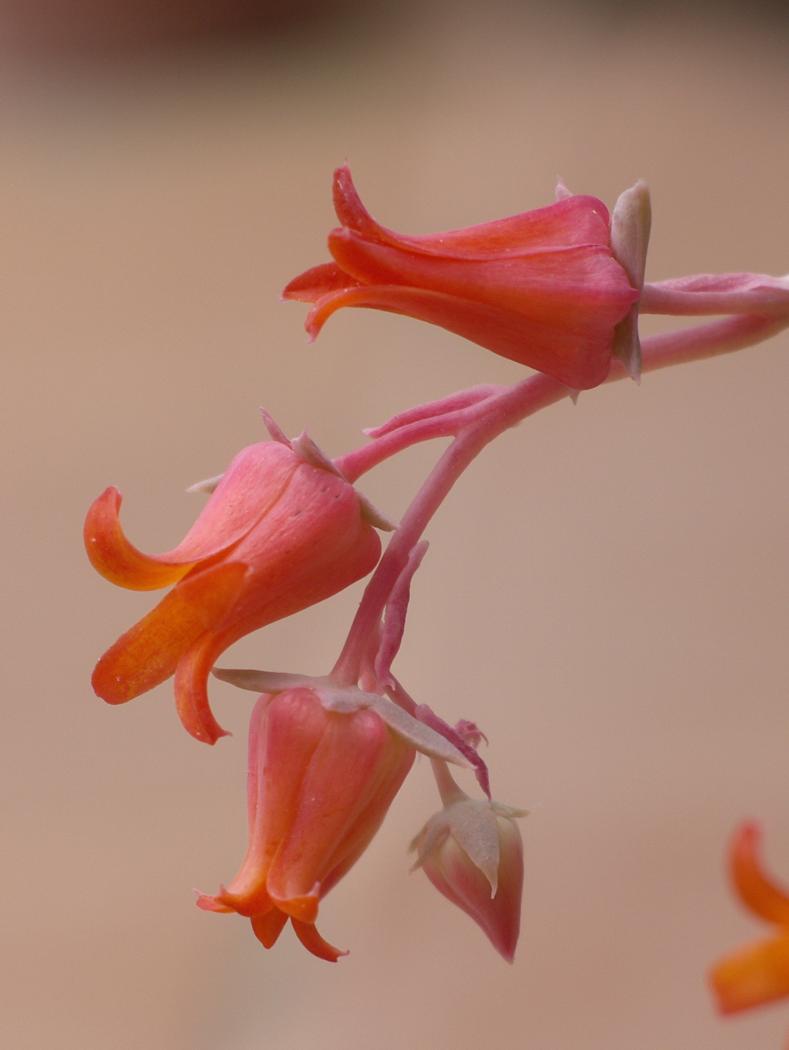
Offline
#15 2015-08-24 09:03:27
- Tom
- Member

- Registered: 2011-09-08
- Posts: 1,722
Re: Echeveria halbingeri (collection de Bob Grim).
Voilà un sujet qui s'étoffe, pour la réhabilitation de cette plante. ![]()
Offline
#16 2015-08-24 13:45:36
- margrit
- Administrator
- Registered: 2007-09-03
- Posts: 5,388
Re: Echeveria halbingeri (collection de Bob Grim).
Cette plante n'est pas originaire de la nature, elle venait d'une collection et personne ne l'a jamais trouvée en habitat. Aussi longtemps que personne ne la rapporte pas du Mexique, les spéculations ne servent à rien.
Offline
#17 2015-08-24 14:05:22
- Tom
- Member

- Registered: 2011-09-08
- Posts: 1,722
Re: Echeveria halbingeri (collection de Bob Grim).
Ce n'est pas la première espèce dont nous ignorons l'origine exacte.
La diagnose de Walther précise la référence CAS 289374, voici donc l'herbier sur cette page.
Si l'on ne veut pas voir E. halbingeri dans la plante de Bob Grim, il est insensé de la voir dans celle de Uhl, à mon avis.
Last edited by Tom (2015-08-24 14:12:19)
Offline
#18 2015-09-19 11:25:26
- Tom
- Member

- Registered: 2011-09-08
- Posts: 1,722
Offline
#19 2015-09-19 12:49:34
- Perle
- Member
- From: Gujan-Mestras - 33
- Registered: 2010-11-24
- Posts: 203
Re: Echeveria halbingeri (collection de Bob Grim).
Effectivement .
Offline
Pages: 1
